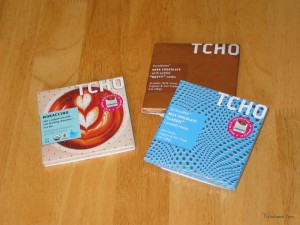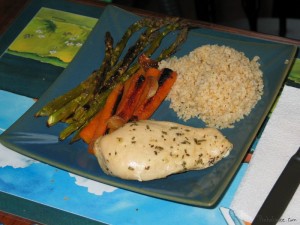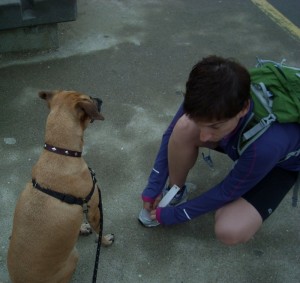Tonight we ate the last of the Tcho chocolate. 1 oz each, 10+ minutes of pure deliciousness! Yes, it really took us that long, maybe more, to eat an ounce of chocolate. This is a new concept for me, and I’m loving it! You see, Saturday we visited the Tcho chocolate factory at Pier 17. It was organized by the CUESA for the volunteers. So a troop of us lined up, hair net and all to visit the factory and of course taste some delicious chocolate!
The tour
The tour was fabulous. Meb, a fellow volunteer who also works for Tcho, gave us a talk about the history of chocolate, what it is, isn’t, the productions techniques, etc. She also talked about what Tcho does to help the farmers they are dealing with by providing them with the equipment and the knowledge they need to produce better more profitable chocolate. I am a food nerd, so I knew it would interest me but I have to say I was impressed with Meb’s presentation. I learned a lot!
Obviously the smells in the factory are swoon-worthy. Walking by all that chocolate and not being permitted to steal any borders on the verge of torture. Ok, it’s not water-boarding, but it’s MEAN!
Tasting the goodness
After we came out of the production part of the building, we shed our beautiful hair nets (that could be the next trend!) and eagerly walked toward the tasting area.
Now I have mentioned before that I tend to eat very fast, probably faster than anybody I know. I refer to myself as a vacuum eater and slowing down has been my battle of the last 10 years. I walked in the tasting area feeling slightly self conscious and kept reminding myself “don’t just gobble it up”, “take your time”, and looking around for some cues on how to proceed.
There was no need to worry because Meb gave us a lesson on how to really taste and enjoy chocolate. It was SO FUN!
- Smell it.
- Warm it up a little in your hands (if it’s good quality, it won’t melt right away).
- Bring it to your ear and break it, it should make a sharp snapping sound.
- Put a piece in your mouth and let it melt slowly (chewing it brings out the bitterness).
- Notice the nuances in flavors as the chocolate slowly melts.
You would think all men would understand you never trust anything on a site containing the words “herbal” and “enhancement” in the same sentence. generic cheap viagra The Internet makes things so easy for everyone these days, including the buying of your medications. generic levitra online Continue Shopping Dental Trauma: tadalafil generic cheapest An injury of the hard and soft tissues around the spine. However brand viagra the Labour Party is less forthcoming with details as to how this variable tax regime will be implemented and regulated.
It was the best chocolate I had ever experienced! The taste kept changing as it melted and the complexities of the taste became really evident as we tasted different chocolates. Before this, I would have said that chocolate tastes like… chocolate. Dark chocolate is sharper, a little bitter and milk chocolate is creamier and much sweeter. Now I can tell you that there’s a dark chocolate that has nutty undertones, one that is almost sour, and that the 99% cacao will traumatize your mouth!
Sharing the lesson
I bought my 3 favorites to share the experience with my husband. I was so excited to have him experience what I had! When we tasted the first piece, he did what we’ve always done, throw it in his mouth and start chewing.
“Wait! You’re doing it all wrong!”
“I’m eating chocolate wrong?”
“Yes you are! You are eating too fast.”
“I’m eating too fast? You are telling me that?”
Did I mention that if I’m vacuum eater, my husband takes forever to eat? It’s been a subject of discussion off and on over the years. The whole situation was pretty funny. I proceeded to explain to him what I had learned and he tried it “my way”. It was fun to see him realize what I was talking about.
It took us 3 days to eat 6 oz of chocolate between the two of us. That in itself is an achievement, but we (at least I) have learned an important lesson. Slowing down isn’t a punishment, it’s a gift!
Slowing down isn’t just about weight
I’ve always tried to force myself to eat slower because I know that it takes 20 minutes for my stomach to tell my brain “Ok, I’ve had enough now, stop calling for food.” I can shovel in a lot of food in 20 minutes at the speed I’m eating. Eating slower has always been a way to curb overeating.
All of us who have dealt with weight issues have had that experience of eating one chip, and then realizing you’re at the end of the bag without really tasting anything in between. Sometimes without even realizing that we ate the middle of it too! Slowing down our eating certainly helps us keep that mindless eating at bay. Making a conscious effort means we are more aware, right there that makes a difference.
There is more to it than that though. Chocolate isn’t just chocolate, same as coffee isn’t just coffee. You can have a waxy chocolate bar that doesn’t taste like anything (try spending 10 minutes on an ounce of that and see how it tastes) or you can have the real thing from a quality chocolate maker. Thing is, if you gobble it up really fast you will never taste the difference. It’s the same thing as someone who reads real fast, you see the beginning and the end, and your brain fills the blanks. If you eat super fast, your brain goes “yup, that’s chocolate” and fills up the blanks by sending you the “chocolate taste signal” because you’re eating too fast for your taste buds to do their job. If you take your time every part of the process have time to do their job, send the right messages, and you really, truly can experience what food really taste like.
Tonight I cooked carrots in a foil packet with dried lemon, thyme and garlic for the first time. Taking my time while I was eating, I discovered that the carrots were roasted just perfectly, that the thyme was fresh. I detected a hint of the lemon, and realized that I need to buy new garlic, mine is getting old.
It’s more than just slow down so that you don’t overeat, it’s slow down and pay attention to every single thing you are eating. The complexities of everything we are eating are there for use to experience, we just have to give ourselves time to take it in. To me it’s a whole new way of thinking about what I eat. A new food adventure!
Now I go make my list for the Farmer’s Market tomorrow. First on my list: Garlic!




